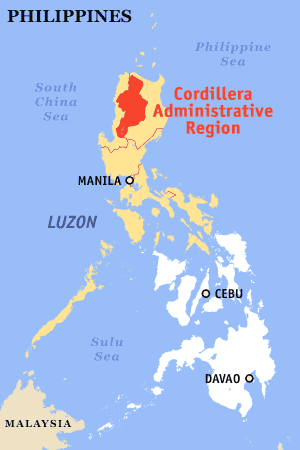Cordillera Administrative Region
|
|
The Cordillera Administrative Region (CAR) of the Philippines consists of six provinces, namely: Abra, Benguet, Ifugao, Kalinga, Mountain Province and Apayao. Baguio City is the regional center. The Cordillera region encompasses most of the areas within the Cordillera Central mountain range of Luzon, the largest range in the country. This region is home to numerous indigenous tribes collectively called the Igorot.
REPUBLIC OF THE PHILIPPINES
2000 census—1,365,220(Xth largest).
Provinces—6
Highly-urbanized Cities—1
Municipalities—76
Barangays—1,176

| Contents |
People and culture
[Demographic detail (population, languages, religion, education, etc.), festivals, etc.]
Economy
Cordillera has abundant mineral reserves. These include metallic ores such as gold, copper, silver, zinc, and non-metallic minerals like sand, gravel and sulfur. Mineral reserves are found in all the provinces. However, mining is concentrated in Benguet.
Geography
Political
CAR is subdivided into 6 provinces and 1city.
Provinces
Cities
Physical
Almost the whole region is situated in the mountainous Cordillera Central range. Located there is Mount Pulag, the second highest mountain in the country, rising at 2,922 meters. Various rivers start here, like the Cagayan River and the Agno River.
Tourist attractions
Tourist attractions in the region include the world famous Banaue Rice Terraces in the province of Ifugao. This is supposedly considered as the "Eighth Wonder of the World". Natural attractions of the region include the Sumaguing Cave in Sagada and the mummy caves of Benguet and Mt. Province. There are four National Parks: Cassamata Hill, Mount Pulag (the second highest mountain in the Philippines with an elevation of 2,922 meters above sea level), Mt. Data and Balbalasang-Balbalan.
History
In July 15, 1987, Executive Order No. 220 was issued which resulted to the creation of the Cordillera Administrative Region (CAR). It is composed of provinces which used to be part of the Old Mountain Province. Republic Act No. 6766 was passed on October 23, 1989. It provided for an Organic Act for the Cordillera Autonomous Region. It mandates the creation of an autonomous government to be headed by a Regional Governor. It creates a Regional Assembly that will enact laws of regional application and a regional judiciary composed of a supreme court and lower courts. The act also directs the proposed autonomous government in the Cordillera to exercise governmental functions, including the raising of taxes, but excluding defense, foreign affairs and monetary functions. However, the Constitution requires that the act has to be ratified by the people in a plebiscite. It was originally scheduled on December 27 of the same year but was reset to January 30 the following by virtue of the Commission on Elections. During the said plebiscite, it was only Ifugao which voted favorably.
Republic Act No. 8438 dated December 22, 1997 created the Cordillera Autonomous Region. In January 1998, a group of lawyers challenged the constitutionality of the act. A plebiscite held on March 9 of the same year was held and invalidated the act.
External links
| Regions and Provinces of Luzon | |
| Ilocos Region: | Ilocos Norte | Ilocos Sur | La Union | Pangasinan |
| Cagayan Valley: | Batanes | Cagayan | Isabela | Nueva Vizcaya | Quirino |
| Central Luzon: | Aurora | Bataan | Bulacan | Nueva Ecija | Pampanga | Tarlac | Zambales |
| CALABARZON: | Batangas | Cavite | Laguna | Quezon | Rizal |
| MIMAROPA: | Marinduque | Occidental Mindoro | Oriental Mindoro | Palawan | Romblon |
| Bicol Region: | Albay | Camarines Norte | Camarines Sur | Catanduanes | Masbate | Sorsogon |
| Cordillera Adm. Region: | Abra | Apayao | Benguet | Ifugao | Kalinga | Mountain Province |
| Metro Manila: | No provinces |
